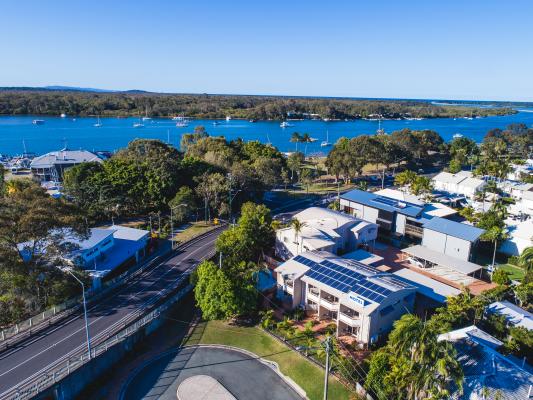Noosa Sun Motel is saving money using the sun. According to manager Darren Keenan, “We started with a 10 Kw system in 2016 and then added another 5 Kws about year later. We thought it would take about five years to pay off the system, but we were delighted when it paid itself off in just over two years. We have also installed solar heating for our pool.
“The key driver for installing solar was to reduce electricity costs. It made sense to have solar installed to run the air-conditioning and lighting for all the guest rooms. Without any direct control over how guests choose to use air-conditioning and electricity within the apartments, it made complete sense. I am very happy with the savings.”
Darren encourages other tourism businesses to look at installing solar, not only for the cost savings, but also because Noosa is in a Biosphere and an environmentally sensitive area, so it is a great way of reducing our carbon footprint.
Noosa Sun Motel is positioned alongside the Noosa River at Noosaville. For over 25 years, its 15 apartments have provided tourists with affordable accommodation by the river.
LOCATION
131 Gympie Terrace, Noosaville
DATE INSTALLED
August 2016
SIZE
15 kW
TECHNICAL
Solahart 255W solar panels
SMA Inverter
ELECTRICITY COST BEFORE SOLAR
$4,000 per quarter
ELECTRICITY COST AFTER SOLAR
$2,000 per quarter
INSTALLATION COST
$17,986
ESTIMATED PAYBACK PERIOD
2.3 years
EMISSIONS REDUCTION
Greenhouse Gas Emissions Reduction per year: 18.2 tonnes of CO2-e
**Energy tips to save $
Saving money on your power bill is easy. Energy efficient households and businesses can save 10-30 percent off electricity bills and still be comfortable year round. Being energy efficient also helps Noosa Shire reach its target of zero net emissions by 2026.
Draught-proof your building so warm air in winter and cool air in summer does not escape. Seal under doors and around window gaps. Check air conditioning vents to ensure they are not letting outside air in and have proper insulation in your roof.
In winter open curtains to let in the sun and then close them at night. In summer open windows or use fans before turning on air conditioners. Setting air conditioners between 24-26 degrees C in summer and 18-20 degrees C in winter uses less energy and is still comfortable.
Choose high energy rating appliances to save money in the long run. Turn appliances off at the wall when not in use or plug them into an energy saving power board. Appliances on standby still cost you when they are not being used.
Install a water efficient shower head to save on water costs and hot water heating. Use cold water to wash your clothes and only operate the dishwasher and washing machine when you have full loads. Then dry your clothes in the sun – Queensland’s biggest energy asset!
Use natural light as much as possible. Install skylights to let the natural light in and always switch off lights when not in use. Replace lights with more efficient LED bulbs.
Household and business emissions (excluding transport) make up around 58 percent of total community emissions. Being energy efficient reduces energy usage, saves dollars and helps the planet.
Go to www.zeroemissionsnoosa.com.au/residential-1 for free solar and energy advice by Noosa Council and Australian Energy Foundation (AEF). Call 1300 23 68 55.







